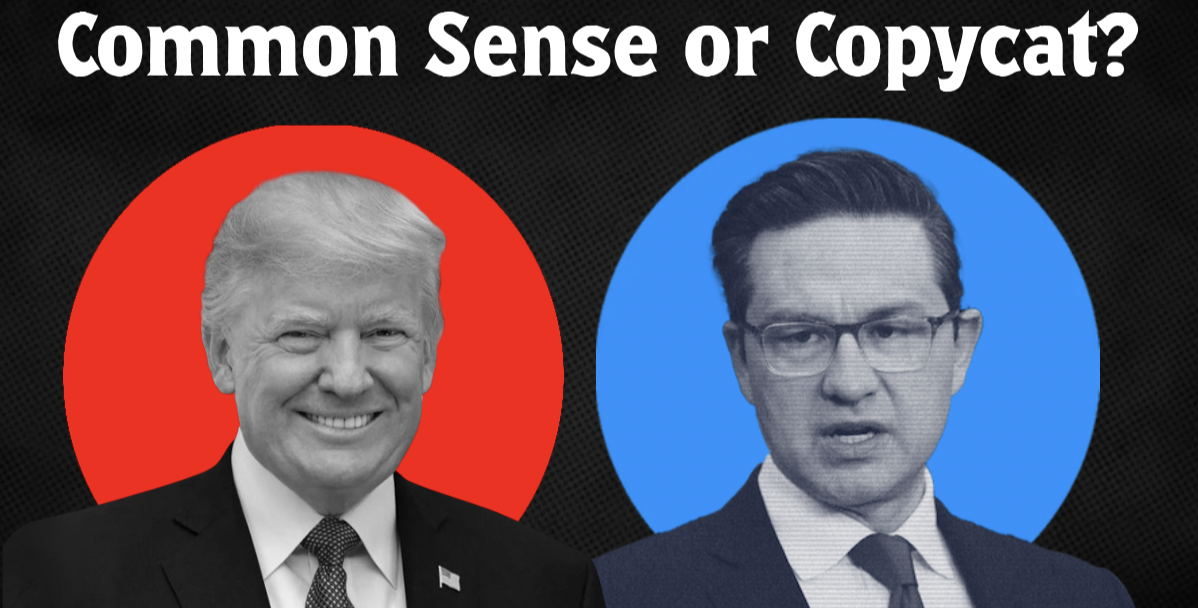Pierre Poilievre's Echoing of Trump’s Rhetoric is Worrying
Recently, Conservative leader Pierre Poilievre’s comments on border crossings, fentanyl, and immigration have raised alarming concerns for many Canadians. His language bears striking similarities to that of President Donald Trump, who frequently employed divisive and fear-mongering rhetoric that threatened the very fabric of Canadian sovereignty and social harmony.
What should be even more concerning to Canadians is how Poilievre’s rhetoric not only echoes Trump’s dangerous language, but also threatens to undermine the values that have long defined Canada as a progressive, inclusive nation. By using inflammatory language around border issues and immigration, Poilievre is not just mimicking Trump’s divisive rhetoric; he is putting our marginalized communities at risk, distracting from real issues that need urgent attention, and aligning himself with dangerous narratives that have the potential to destabilize Canadian society.
The Trump Parallel: Fentanyl, Border Crossings, and Immigrants
One of the most striking features of Trump’s presidency was his use of fear-based language to create an “us versus them” mentality. From his infamous calls for a border wall with Mexico to his criminalization of immigrants and obsession with “bad hombres,” Trump frequently painted a picture of immigrants as threats to national security and well-being. This language often included ominous references to drugs, crime, and terrorism—all framed within the context of immigration and border control.
Poilievre, it seems, has adopted a similar approach. His repeated focus on the illegal movement of fentanyl across the Canadian border and his rhetoric about "uncontrolled immigration" are eerily reminiscent of Trump’s insistence on the dangers posed by illegal immigration and drug trafficking. In 2019, Trump ominously suggested that Canada was a weak link in the fight against fentanyl trafficking, claiming that "drugs are pouring in through the northern border," an argument that was as much about demonizing immigrants and refugees as it was about addressing public health crises. Now, in 2024, he is making the same accusations as justification for implementing a 25% tariff on all Canadian imports as well as vague threats of turning Canada in the "51st State".
Poilievre’s recent rhetoric follows a similar pattern: using the fentanyl crisis as a convenient wedge to stoke fear, blaming immigrants for criminal activities, and proposing stricter border controls as a solution. Yesterday, he even tweeted that "weak Justin Trudeau and the NDP-Liberals have totally lost control of the borders....No wonder our communities are overrun with illegal guns and poisonous fentanyl." This framing echoes Trump’s divisive narrative verbatim, and presents a narrative that views immigration through a lens of suspicion and fear rather than compassion and support. In fact, the only support he appears to be showing is toward Donald Trump's blatant disrespect of Canada's well-being and sovereignty. Fentanyl, the border, and immigration have become Trump's justifications for disregarding Canada's sovereignty and economic well-being, so why is Pierre Poilievre repeating him?
A Threat to Canadian Sovereignty?
What’s even more alarming is the subtle threat embedded in Poilievre’s language: the possibility of turning Canada into the "51st state" of the U.S. For the past couple of weeks, Trump repeatedly threatened that Canada’s immigration policies could lead to more stringent border controls or even U.S. intervention to protect American interests. This rhetoric wasn’t just about enforcing laws—it was about undermining Canada’s sovereignty, suggesting that the country’s independent stance on issues like immigration and border control was a vulnerability.
Poilievre’s repeated reference to U.S.-style solutions—such as tougher border enforcement, criminalizing asylum seekers, and pursuing more stringent immigration policies—calls into question his commitment to maintaining Canada’s autonomy. While he stops short of outright endorsing Trump’s threats towards Canada, the rhetoric is remarkably similar. In seeking to align himself with Trump's brand of politics, Poilievre risks reducing Canadian immigration discourse to the same toxic level seen south of the border, one that treats migrants and refugees as threats rather than human beings in need of compassion.
A Concerning Trend
Pierre Poilievre’s embrace of Trump-like rhetoric is troubling for many reasons. It jeopardizes Canada’s values of inclusion, compassion, and respect for human rights, all while stoking fear and division. It targets marginalized communities, making them more vulnerable to hate and discrimination, and it shifts attention away from the real, urgent issues facing Canadians today. Not to mention, with Trump's repeated threats to not only sink our economy, but potentially invade our country, now is not the time to pander to his politics. Canadians needs a leader who is willing to stand up to Trump's blatant disregard and disrespect of Canada's well-being and sovereignty, not one who galvanizes his dangerous rhetoric like Poilievre does.
While Poilievre may believe that this kind of divisive rhetoric will win him political points, it ultimately poses a dangerous threat to Canada’s unity and well-being. It is crucial that Canadians recognize the danger in adopting Trump-style politics, particularly when it threatens to erode the very values that make Canada a beacon of hope and progress in the world. As we move forward, it is more important than ever to reject rhetoric that divides and instead focus on policies that heal and unite—policies that prioritize the well-being of all Canadians, not just the few.



.jpg)

Comments
Post a Comment